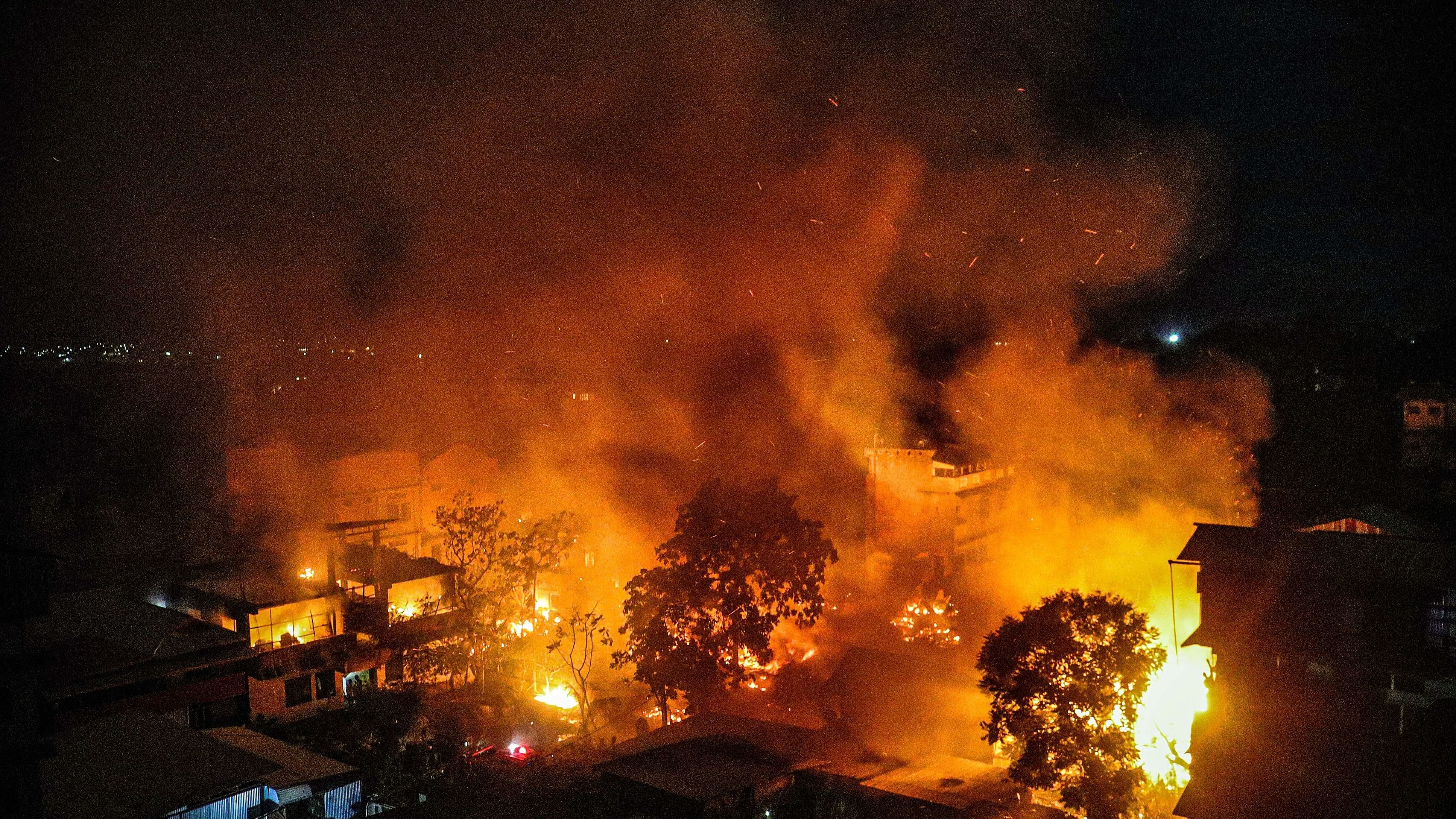
Smoke and flame billows out after houses were set on fire by miscreants in Imphal on Tuesday.
Credit: PTI Photo
When the calm and collected voice of Dr Homendro Irengbam settles down to static over the phone, you are left with an uneasy knot in the throat. He speaks of death, discrimination, violence, arson and hate as if he was detached from it. He isn’t though. He’s actually right in the middle of the storm.
As the core member of the Eastern Sporting Union (a highly successful women’s football club in Manipur) dives into describing the gore that is all of Manipur with eloquence, you begin to wonder if you should at all proceed with this line of query.
“…you don’t have to feel bad for us,” he adds with unnecessary sympathy. “We have dealt with such things in the past, and we’re a strong people. We will overcome this too.”
Homendro then, rather seamlessly, dials it back to better times when a mostly even number of Meiteis and Kukis would participate for the community club in Imphal.
“These girls are now out there, in the dark, guarding their houses,” he says. “We have almost stopped training altogether because sports is hardly a priority at a time like this. Also, the parents are telling the kids stories that, frankly, some of them are not ready to hear. They (the parents) are telling the kids to not play alongside the other community.
“Kids don’t have this kind of hatred in their heart, they just want to play, but right now, they have to save themselves and their families so that’s what they are doing,” he adds.
This has been the state of Manipur for the last six months, and it all started when the high court ruled in March that the majority Meitei would get scheduled tribe status, entitling them to the same economic benefits and quotas in government jobs and education as the minority Kuki.
The ruling also allowed Meities to buy land in the hills where the Kukis predominantly live, which in turn instigated a sense of insecurity about lands, jobs and opportunities.
“So many promising athletes have died in the last few months,” reveals Longjam Meena Devi, a sociologist from Manipur. “It’s brutal here. We have not been able to go out at night, but we have to take turns guarding our houses. So many people have lost their lives and their houses in fires.”
Meena then reveals the story of 20-year-old Mangminjoi Haokip. “He was a promising footballer, but he had stopped playing briefly due to poverty. But he was caught in a crossfire between the police and the locals in the Kingpokpi district, near Saikul,” she says. “He was shot in the head. Those pictures are impossible to digest. We see so many pictures of severed heads on our phones these days.”
Angom Surjit Meitei, the coach of judo sensation Linthoi Chantbam, takes several moments between the phone call to compose himself. The man knows a thing or two about combat, but this, he says, is unbecoming of people.
“I still train some of the kids because we have the nationals coming up, but we do it discreetly,” he speaks in a hushed tone. “We have to go and pick up some of the kids ourselves because it’s too dangerous for them. We used to train the nights before but the last few weeks there has been a lot of violence in the nights so we try and do it in the morning. We get an hour at best but that’s not enough for them to do well.”
“Honestly, what’s worse is that these things stay with young people, and it changes their mindset and their trajectory as a person,” he adds.
Take Chinglensana ‘Sana’ Singh for example. The Hyderabad FC player in the Indian Super League lost his home to arson while he was playing an AFC qualification game. “…there were gunshots, attacks, and burning of houses where we reside,” he said in an interview recently.
Sana, thankfully, didn’t lose any of his family members in the incident. Others weren’t so lucky.
That’s why the likes of L Anita Chanu, N Kunjarani Devi, L Sarita Devi, W Sandhyarani Devi, S Mirabai Chanu and several other high-profile athletes have threatened to stop representing India in the future, and also said that they would not train any budding talent either.
During the press conference, they issued an ultimatum, saying they would return medals of national recognition should the government not intervene and restore peace.
While they wait for sanity to prevail, Manipur burns, and sport with it.